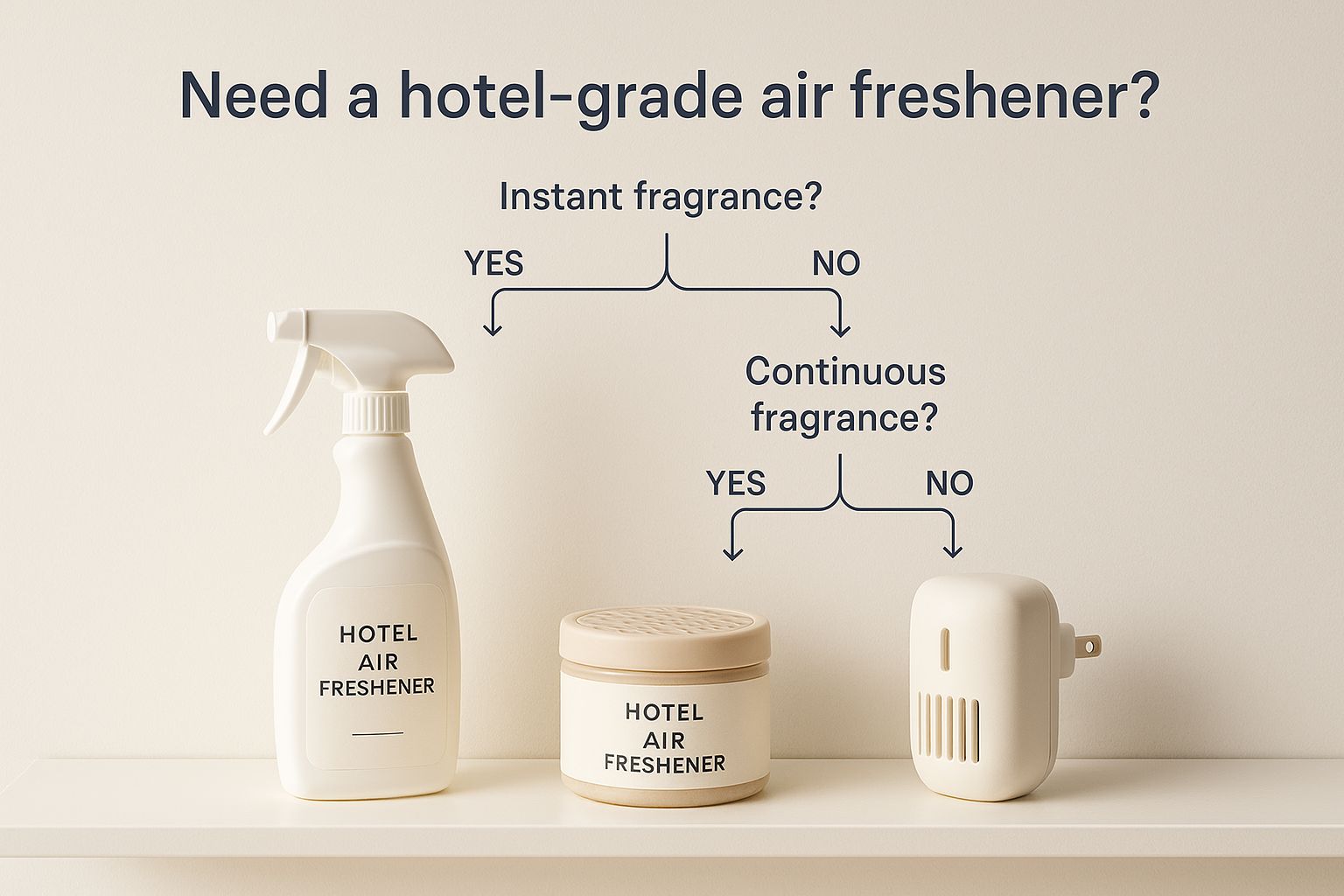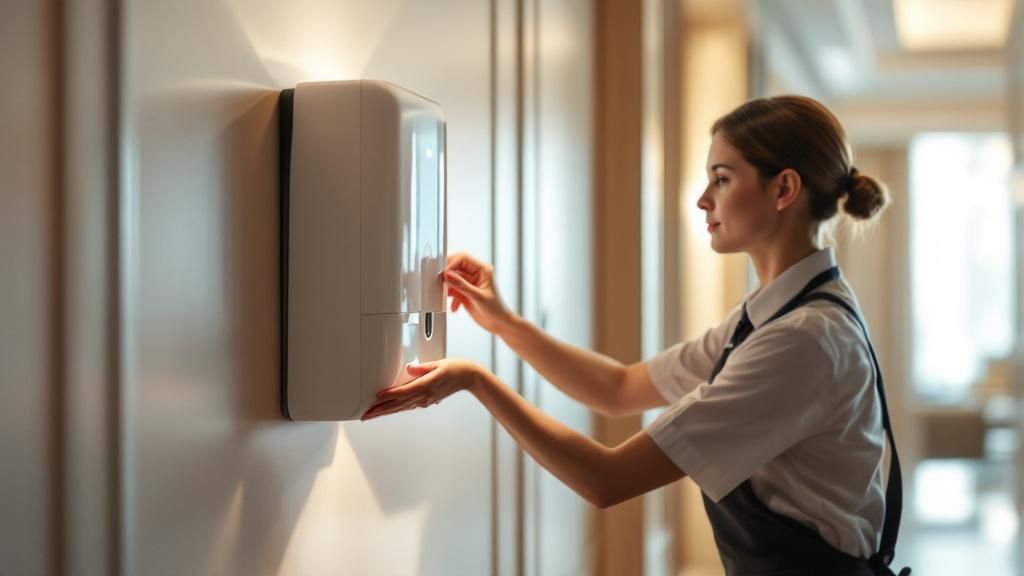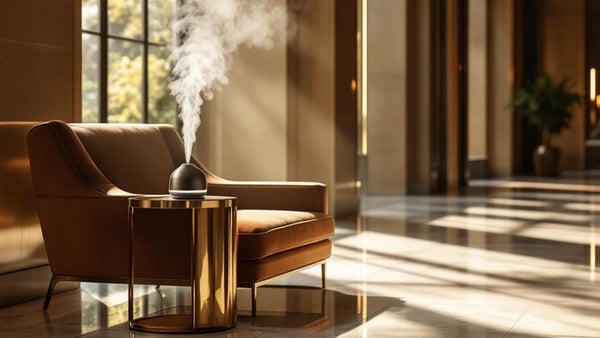Air Freshener for Hotels Your Scent Marketing Guide
Sep 01, 2025
The right air freshener for hotels is so much more than just a pleasant smell; it’s a powerful tool for crafting an unforgettable guest experience. The best hotels use sophisticated scenting systems, often tied directly into their HVAC, to diffuse a unique, signature fragrance. This isn't just about covering up odors—it's about building an immediate emotional connection the moment a guest arrives. This strategy, known as scent branding, transforms a simple lobby into a luxurious, welcoming escape.
The Power of Scent in Modern Hospitality
The guest experience starts the second someone walks through your doors. Long before they take in the decor or speak to your staff, their sense of smell is already forming a powerful, subconscious first impression that can color their entire stay. Why? Because our olfactory sense is hard-wired to the parts of our brain that control memory and emotion.
A carefully chosen fragrance can elevate a lobby from a simple entryway to a truly luxurious, branded space. Think of it as an invisible welcome mat, instantly communicating a message of care, quality, and meticulous attention to detail. This first sensory handshake makes guests feel more relaxed, comfortable, and valued from their very first breath.
Understanding Scent Branding
This strategic use of fragrance has a name: scent branding. It's the art and science of creating a signature aroma that becomes woven into the fabric of your hotel's identity. We're not just talking about masking stale air; this is a sophisticated marketing tool.
A signature scent works as an ambient communication tool. It consistently reinforces your brand’s unique character and promise without a single word, creating a seamless thread that ties a guest's positive memories directly back to your property.
For instance, a chic, modern hotel might go for a crisp, clean scent with notes of white tea and citrus. On the other hand, a cozy, rustic lodge would feel more at home with a warm, grounding fragrance of cedarwood, vanilla, and spice. The key is to pick an aroma that tells your brand's story. If you want to dive deeper into this idea, check out our guide on creating unforgettable hotel lobby scents.
The Psychological Impact of Scent
The perfect air freshener for hotels does more than just smell nice—it actively influences how guests feel and act. Research has shown that a pleasant ambient scent can trigger several positive effects:
- Improved Perception of Quality: Guests in a beautifully scented environment are more likely to view the hotel's services, amenities, and even the staff in a more positive light.
- Increased Dwell Time: A welcoming aroma encourages people to linger longer in common areas like the lobby, bar, or lounge. That can naturally lead to increased spending.
- Stronger Brand Recall: Scent forges powerful, lasting memories. A fragrance that is uniquely yours makes your hotel stand out from the competition in a very real way.
- Enhanced Guest Loyalty: When guests link your signature scent with a wonderful experience, they feel a genuine connection to your brand and are far more likely to return.
Ultimately, investing in a high-quality scenting strategy is an investment in the guest experience itself. It’s a subtle but profound way to build an emotional connection, boost perceived value, and earn lasting loyalty from the moment someone walks in.
Choosing the Right Scenting Technology
Picking the right air freshener for hotels isn’t a one-size-fits-all game. It’s really about matching the technology to the specific purpose and scale of each space in your property. To create that seamless scent journey for your guests, you need a full toolkit of different delivery systems, each with its own unique strengths. Think of it like a chef—they wouldn't use a paring knife for a task that needs a cleaver. The same principle applies here.
The push to create truly memorable guest stays has fueled some incredible advancements in scenting technology. In fact, the global air freshener market is currently valued at a staggering USD 17.4 billion and is only expected to climb over the next decade. Hotels are a huge piece of that pie, always on the lookout for better, longer-lasting fragrances and smart, automated dispensers that deliver scent reliably and precisely. You can dig deeper into these market trends and their impact on the hospitality industry.
To help you get started, the image below acts as a quick decision tree, guiding you toward the best products for different hotel zones, from sprawling lobbies to cozy guest rooms.

This visual guide breaks down the choices by connecting specific hotel spaces with the most effective scenting solutions, factoring in things like the size of the area and the desired scent intensity.
HVAC Systems for Large-Scale Scenting
When you need to create a consistent, immersive atmosphere in large, open areas like your lobby, main corridors, or conference halls, HVAC (Heating, Ventilation, and Air Conditioning) scent diffusers are the undisputed champion. These systems tap directly into your building's existing ventilation, using the airflow to distribute a fine, invisible mist of fragrance evenly across massive spaces.
It’s like having a central nervous system for your hotel's signature aroma. Instead of cluttering your space with multiple smaller units, a single HVAC system can cover thousands of square feet. This ensures every guest gets the exact same welcoming fragrance the moment they walk through the door, making it a powerful tool for brand consistency.
Why HVAC Systems Are a Game-Changer:
- Uniform Coverage: They deliver a perfectly consistent scent, getting rid of those awkward "hot spots" of strong fragrance and dead zones where there's no scent at all.
- Completely Discreet: The technology is hidden away within your HVAC infrastructure, so it’s completely invisible to guests.
- Highly Efficient: These systems use a cold-air diffusion method that doesn't use heat, which preserves the integrity of the fragrance oils for a purer, truer scent experience.
Standalone Nebulizing Diffusers
While HVAC systems are brilliant for widespread coverage, they aren't the right tool for creating distinct atmospheres in smaller, enclosed areas. That's where standalone nebulizing diffusers come in. These devices are perfect for "scent zoning"—assigning a unique, purpose-driven fragrance to specific locations like a spa, fitness center, or VIP lounge.
A nebulizing diffuser works without water or heat, atomizing pure fragrance oil into an ultra-fine dry mist that lingers in the air much longer. For instance, you could place a unit with a calming lavender and chamomile scent in your spa, while a different unit diffuses an energizing citrus aroma in the gym to get people motivated.
These standalone units give you granular control over your scent journey. They empower you to curate specific moods for distinct environments, enriching the guest experience in each unique space.
Scent Solutions for Guest Rooms
The guest room is a personal sanctuary, so your scenting approach here needs to be much more subtle and intimate. A common mistake is overpowering a small, enclosed space. The real goal is to provide a gentle, clean, and welcoming aroma that feels luxurious, not intrusive.
Here are a few great options for individual rooms:
- Smart Plug-in Diffusers: Modern plug-ins have come a long way. Many now offer programmable schedules and intensity levels, giving you controlled release of fragrance.
- Reed Diffusers: An elegant and super low-maintenance choice. Reed diffusers provide a continuous, subtle scent that’s perfect for bathrooms or sitting areas.
- Room Sprays: A high-quality, non-aerosol room spray is a great tool for housekeeping to refresh rooms between stays, providing an immediate burst of freshness right before the next guest arrives.
Comparing Hotel Scenting Technologies
With all these options, it can be tough to decide what goes where. Each technology has a role to play in a well-rounded scent strategy. This table breaks down the key differences to help you make an informed choice for every corner of your property.
| Technology Type | Best For | Coverage Area | Maintenance Level | Pros | Cons |
|---|---|---|---|---|---|
| HVAC Scent Diffuser | Lobbies, hallways, large common areas | 5,000 - 15,000+ sq ft | Low (refill oil quarterly/annually) | Uniform scent, discreet, highly efficient | Higher initial investment, professional installation needed |
| Standalone Nebulizer | Spas, fitness centers, smaller lounges | 500 - 2,000 sq ft | Medium (refill oil monthly) | Targeted scent zoning, portable, powerful | Can be noisy, requires regular refills |
| Smart Plug-in Diffuser | Individual guest rooms, small offices | 100 - 500 sq ft | Medium (replace cartridge monthly) | Programmable, affordable, compact | Scent can be inconsistent, may look clinical |
| Reed Diffuser | Guest bathrooms, small entryways | 50 - 150 sq ft | Very Low (replace every 2-3 months) | No power needed, elegant look, continuous scent | Limited coverage, less intense fragrance |
| Room Spray | Guest rooms (post-cleaning), spot treatment | N/A | High (manual application) | Immediate effect, versatile, low cost | Short-lived, labor-intensive, inconsistent |
By combining these different technologies, you can build a sophisticated and cohesive scent strategy. Your choice of air freshener for hotels should always be a deliberate one—using large-scale systems for branding and smaller, targeted units to enhance the atmosphere where it matters most.
How to Select Your Hotel's Signature Scent
Think of your hotel’s fragrance as its invisible brand ambassador. A thoughtfully chosen air freshener for hotels does so much more than just make a lobby smell nice—it tells a story, crafts a mood, and creates a memory that guests carry with them. This is your chance to move beyond generic "clean" scents and pick a fragrance profile that genuinely captures your property's unique spirit.
Your scent is basically an olfactory uniform. A sleek, modern downtown hotel feels perfectly in sync with a crisp, sophisticated fragrance—think notes of white tea, ginger, and a hint of citrus. On the other hand, a rustic mountain lodge is much better served by the warm, grounding aroma of cedarwood, amber, and subtle spice. The real goal is to forge an instant, subconscious link between the scent and the physical space your guest is standing in.

Matching Fragrance Families to Your Brand
A great starting point is getting to know the major fragrance families and the specific vibe each one creates. Every family has a distinct personality, and finding the right one is the first, most important step in crafting your hotel's aromatic signature. When the scent aligns with your brand, it just feels right.
- Fresh & Clean: This family is all about notes of citrus (like lemon and bergamot), green tea, and aquatic elements. It’s the perfect match for modern, minimalist hotels, fitness centers, or any property aiming to project energy, clarity, and efficiency.
- Woody & Earthy: Here you’ll find scents like sandalwood, cedarwood, vetiver, and oud. These grounding aromas are ideal for lodges, historic hotels, or anywhere you want to create a feeling of warmth, stability, and classic luxury.
- Floral & Sweet: This family is home to timeless notes like jasmine, rose, lavender, and gardenia. It works beautifully for romantic boutique hotels, spas, and venues that want to evoke elegance, tranquility, and grace.
- Oriental & Spicy: Full of warm notes like vanilla, amber, cinnamon, and musk, this family is unapologetically bold and luxurious. It’s a fantastic fit for opulent, high-end hotels that want to create an atmosphere of exotic comfort and indulgence.
Your signature scent should feel like a natural extension of your design and service philosophy. It’s not just an accessory; it’s an essential element of the immersive world you are building for your guests.
This shift toward curated sensory experiences is happening all over the industry. The air freshener market jumped from USD 11.78 billion to USD 12.72 billion in a single year, a surge driven by consumers wanting products that offer wellness benefits, not just odor control. For hotels, this is a huge opportunity to stand out by embracing sustainable, high-quality fragrances. You can dig into the data behind this trend in the global air fresheners market analysis.
Prioritizing Quality and Guest Wellness
Once you’ve zeroed in on a fragrance family that clicks with your brand, the next step is critical: prioritizing the quality of the fragrance oil itself. Today’s guests are more health-conscious and environmentally aware than ever before. Cheap, synthetic fragrances can be loaded with volatile organic compounds (VOCs) that might trigger allergies or sensitivities.
That’s why choosing high-quality, hypoallergenic, and essential oil-based fragrances is simply non-negotiable. These premium oils don't just smell better and more complex; they also signal a commitment to wellness and sustainability. It's a choice that shows you care about your guests' well-being, and discerning travelers will absolutely notice. To go deeper on this, check out our detailed guide to choosing the perfect hotel fragrance oil.
At the end of the day, your signature scent is a key investment in your brand’s identity. By taking the time to select a high-quality fragrance that tells your story, you create a powerful sensory beacon that draws guests in, makes them feel at home, and leaves a lasting impression long after checkout.
Crafting a Cohesive Scent Journey for Guests
Powerful hotel scenting isn't about blasting every room with a strong fragrance. The real art is in creating a subtle, cohesive "scent journey" that guides your guests as they move through the property. We do this with a strategy called scent zoning—using different, yet complementary, fragrances to define each space and match its intended purpose.
Think of your hotel as a story. Each area is a different chapter, and the scent should fit the mood and activity. But just like turning a page, the transition from one chapter to the next has to feel natural. A jarring or sudden scent change can feel cheap and disruptive, completely undoing the luxurious atmosphere you’ve worked so hard to create.
The Blueprint for Scent Zoning
The first step in mapping out your scent zones is to think about what each area is for. The goal is simple: pick a fragrance that enhances the feeling you want guests to have in that specific space. A well-designed scent journey quietly elevates their experience, making every part of your hotel feel both distinct and connected.
Here’s how scent zoning plays out in the real world:
- The Fitness Center: This space is all about energy and motivation. An invigorating citrus scent with notes of lemon, grapefruit, or green tea keeps things feeling fresh and clean, encouraging a great workout.
- The Spa: Tranquility is the name of the game here. A calming aroma of lavender, chamomile, or eucalyptus is perfect for promoting relaxation and preparing guests for their treatments.
- The Lobby & Common Areas: These high-traffic spots should feature your hotel's signature scent. This is the main theme of your scent story—the consistent, welcoming anchor that reinforces your brand identity.
This approach makes sure the fragrance always feels right for the environment. After all, a relaxing lavender scent would feel completely out of place in a high-energy gym, just like a sharp citrus aroma might shatter the calm of a spa.
Ensuring a Seamless Scent Transition
Once you’ve mapped your zones, you need to make the journey between them feel smooth. The trick is to choose scents that share common base notes or belong to complementary fragrance families. This creates a harmonious flow instead of a jarring clash of aromas.
For example, if your signature lobby scent is a complex blend of white tea and cedarwood, you can easily branch off from there. The spa could feature a lavender scent that also has subtle woody undertones. Meanwhile, the business center might use a light bergamot fragrance that shares a fresh top note with the white tea. It all connects.
A cohesive scent journey feels intentional and luxurious. It's a subtle signal to guests that every single detail of their experience has been thoughtfully considered, from the decor they can see to the air they breathe.
Technical Placement and Airflow
The final piece of the puzzle is the technical side of things. Even the most perfect scent map will fall flat if the diffusers are in the wrong places. You want to create an immersive atmosphere where the scent is present but the source is discreet—a critical factor when choosing an air freshener for hotels.
Keep these technical points in mind for the best placement:
- Work with Airflow: Position diffusers near air vents or in areas with natural circulation. This helps the fragrance spread evenly and stops it from becoming too heavy in one spot.
- Stay Discreet: Diffusers should be smelled, not seen. Tuck standalone units behind furniture, in corners, or inside decorative planters to keep them out of sight.
- Adjust Intensity by Space: The size and purpose of a room dictate how strong the scent needs to be. A huge, open lobby needs a much more powerful diffusion setting than a small, quiet library.
- Avoid Scent Overlap: Be careful around doorways and transition areas. Make sure diffusers are placed far enough apart that their scent zones don't aggressively compete, which can create a muddled, unpleasant smell.
By carefully planning your scent zones and paying close attention to technical placement, you can turn a simple fragrance strategy into a sophisticated and memorable journey that truly defines the guest experience.
Keeping Your Scent Experience Flawless
Putting a high-quality scenting system in place is a great start, but the real magic is in the follow-through. If the system is inconsistent or poorly maintained, it can completely undermine your efforts and create a jarring experience for guests. To make sure your hotel always smells perfect, you need a practical maintenance routine that keeps everything running like clockwork.
This is about more than just avoiding a bad impression; it’s about protecting your investment. A well-maintained air freshener for hotels is what delivers that reliable, high-end ambient fragrance that reinforces a premium guest experience, visit after visit. It's the behind-the-scenes work that makes effortless luxury possible.
Setting Up a Routine Maintenance Schedule
Just like any other critical hotel system, your scent diffusers need regular attention. The key is to create a simple, repeatable checklist that staff can follow without having to guess. Leaving maintenance up to chance is just asking for inconsistency and, eventually, equipment failure.
A proactive schedule nips common issues in the bud, ensuring your signature scent is a constant, welcoming presence—not an unpredictable one.
Your routine checklist should cover these core tasks:
- Weekly Scent Intensity Check: Have a designated staff member walk through the key scented zones once a week. Their only job is to make sure the fragrance is noticeable but not overpowering, making tiny adjustments if needed.
- Monthly Oil Refills: Set specific dates on the calendar for refilling the fragrance oil. Letting a diffuser run dry can seriously damage the unit and lead to expensive repairs.
- Quarterly Nozzle Cleaning: Over time, diffuser nozzles can get clogged, especially if you use thicker essential oils. A quick quarterly cleaning with isopropyl alcohol will prevent blockages and keep the mist fine and even.
The Battle Against "Nose Blindness"
One of the trickiest challenges in scent maintenance is something called olfactory fatigue, or nose blindness. It’s that natural thing that happens when your staff and regular guests get so used to the hotel's signature scent that they just don't notice it anymore.
When your team can no longer smell the fragrance, they can't accurately judge its strength. This is when they start turning up the diffusers, creating a scent that feels overwhelming to new guests walking in for the first time.
To get around this, schedule "fresh nose" checks. Every so often, ask a staff member who works in a different, unscented area of the hotel to walk through the lobby or common spaces. Get their honest feedback on the scent level. This gives you an unbiased opinion from someone who isn't desensitized to the aroma.
This simple trick helps you maintain that perfect, subtle balance that wows first-time visitors without ever feeling too strong.
Training Your Team to Be Scent Guardians
Think of your staff as the first line of defense in maintaining a perfect scent experience. When you empower them with the right knowledge, they can spot and report issues long before a guest ever would. A well-trained team is your early warning system.
The training doesn’t need to be complicated. Just focus on:
- Spotting Equipment Issues: Teach staff to recognize the tell-tale signs of a malfunctioning diffuser—things like weird noises, visible oil residue around the unit, or a complete lack of fragrance.
- A Clear Reporting Protocol: Create a super simple process for reporting problems. This could be a designated contact person or a logbook for the maintenance team to check.
- Listening to Guest Feedback: Encourage your front-desk staff to pay attention to any comments guests make about the scent—good or bad—and to pass that feedback along.
This hands-on approach is more important than ever as the market keeps growing. The air freshener industry was valued at around USD 15.03 billion and is projected to nearly double to almost USD 32 billion by 2035, a boom driven largely by smart, automated electric diffusers. As hotels adopt these systems to cut down on manual work and elevate the guest experience, a well-trained team ensures you’re getting the most out of these powerful tools. You can find more insights into the growth of the smart air freshener market and see why staying on top of maintenance is key.
Measuring the ROI of Your Scent Strategy
Bringing a professional scenting system into your property isn't just another line item on the expense report. Think of it as a direct investment in your brand's identity and, more importantly, in your guests' loyalty. But how do you know if it's actually paying off?
A thoughtfully planned air freshener for hotels strategy delivers a return you can see and measure, reflected in tangible guest feedback and your most important performance metrics. The goal is more than a nice smell—it’s about drawing a clear line from that specific scent to a real-world boost in your business. You have to treat your scent strategy just like any other marketing campaign: set your goals, roll it out, and then track the results to see what’s hitting the mark.
Connecting Scent to Key Metrics
To really grasp the value of your scent program, you have to tie it to the numbers that actually drive your bottom line. This means looking past the initial cost of diffusers and fragrance oils and focusing on how the right atmosphere influences what your guests do and how they feel. It's about connecting the dots from a great sensory experience to positive business outcomes.
Here are a few key areas where you can track the connection:
- Guest Satisfaction Scores: Look for a noticeable lift in scores tied to ambiance, cleanliness, and the overall experience right after you introduce your new scent.
- Positive Online Reviews: Keep an eye on TripAdvisor, Google, and Yelp. Mentions of the hotel's "lovely smell" or "relaxing atmosphere" are pure gold.
- Increased Repeat Bookings: Are guests coming back more often? A memorable and pleasant scent is a powerful, subconscious reason for them to choose you again.
- Higher Ancillary Revenue: Guests who feel relaxed and comfortable tend to stick around longer in your lobby, bar, and restaurants. That extra dwell time often leads to more spending.
Gathering Direct Guest Feedback
While the data gives you the big picture, nothing beats hearing directly from the people you're trying to win over. When you proactively ask for opinions, it shows guests you care about their experience and gives you priceless insights to fine-tune your approach. This feedback loop is the best way to confirm your scent choices are having the effect you want.
Try adding a specific question about your hotel's ambiance to your post-stay surveys. Something as simple as, "How did the hotel's signature scent contribute to your overall experience?" can unlock some incredibly powerful answers.
At the end of the day, a successful scent strategy does far more than just make your property smell good. It sharpens your brand identity, gives you an edge over the competition, and contributes directly to your revenue. If you're ready to find the right equipment to get started, check out our guide on the best commercial air fresheners. By measuring its impact from the beginning, you can turn your scent program from a simple amenity into a proven, revenue-generating asset.
Your Questions About Hotel Scenting, Answered
Stepping into the world of professional scenting can feel a little daunting. You've got questions about everything from cost to guest safety, and you need straight answers before you can make a smart decision. Let's break down the most common things hoteliers ask when considering an air freshener for hotels.
How Much Does a Professional Hotel Air Freshener System Cost?
The price tag on a hotel scenting system really depends on the size of your property and the kind of tech you go with. A large-scale HVAC system, for example, is more of an upfront investment. But for covering huge lobbies and common areas with one consistent, beautiful fragrance, it's incredibly efficient.
On the flip side, standalone nebulizing diffusers are much more affordable to start with and give you a ton of flexibility. You can place them strategically in specific zones, like the spa or a VIP lounge. Think of it as a scalable approach—you can start by scenting just the key high-traffic areas and then expand the system as you start to see the impact.
Are Essential Oil Diffusers Safe for All Hotel Guests?
Guest safety and comfort are non-negotiable. The good news is that high-quality, pure essential oil fragrances are generally very safe. In fact, many properties prefer them for their natural, non-synthetic qualities. The trick is to source hypoallergenic oils and use professional-grade diffusion technology that creates a super-fine, dry mist.
This modern cold-air diffusion method is key. It disperses the scent without leaving any residue or releasing nasty volatile organic compounds (VOCs). This creates a pleasant, clean, and safe atmosphere for almost everyone, even guests who might be sensitive to traditional air fresheners or aerosol sprays.
How Do I Choose a Signature Scent That Everyone Will Like?
Here’s the secret: the goal isn't to find a scent that every single person loves. It's about finding one that is sophisticated, subtle, and has a broad appeal. You're looking for a fragrance that elevates the environment without screaming for attention. The safest and most effective signature aromas are almost always the ones that are universally pleasing.
Opt for clean, elegant, and understated notes. Fragrances built around white tea, light citrus, green tea, sandalwood, or soft florals are excellent choices that feel luxurious and welcoming without being polarizing.
We always suggest testing two or three final scent options right there in your lobby. This lets you get real-time feedback from staff and a few trusted guests before you commit to a full rollout across the property.
Ready to create an unforgettable sensory experience for your guests? Airomatica offers a complete range of luxury fragrance oils and advanced scent diffusers designed to elevate any commercial space. Explore our collection and find the perfect signature scent for your hotel today.



